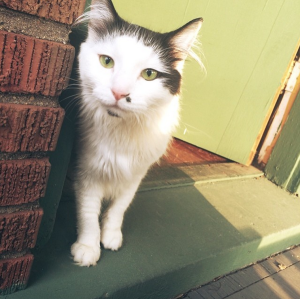Required reading before continuing.
I had a remarkably similar experience to Rachel’s. Actually, maybe it isn’t that remarkable. I’d guess that hundreds of women read that article and thought, me too.
On a Thursday in the spring of 2011, I spent the day experiencing a pain that was constant but bearable. I thought it might be pre-menstrual cramps or a pulled muscle. By the evening, it was no longer bearable and I asked my roommate to take me to an urgent care. She looked at me, doubled over in pain, and said we needed to go to the ER, not urgent care.
I’d been to the ER once when I was 10, when I broke my arm in a soccer game. Actually, I had broken it the day before. Maybe I have an extremely high pain tolerance. Maybe by 10 I was already used to downplaying my pain.
We got to the ER, where I struggled to fill out paperwork and told them my pain was a 10. Like in Rachel’s story, they assumed it was kidney stones.
I vomited on the floor of the ER because the pain was so intense.
They put me in a separate small room because I kept crying out in pain, then was told by a male nurse that the noises I was making would not help the type of pain I was experiencing.
I thought I was dying. I asked friends to pray for me because that seemed the only path to being healed while I waited for a doctor.
Five hours later, I was finally admitted. I went through the same spiel I gave to ER nurses – how the pain had progressed, where it was focused, what it felt like (a knife stabbing my insides then being twisted through my organs).
They gave me morphine. It didn’t help. They gave me Dilaudid. The pain dulled slightly. Like Rachel, it mostly just made me sleepy. I drank something that tasted awful and they did a CT scan. They found that I had a cyst that had overtaken my ovary. Luckily for me, it wasn’t wrapped around the fallopian tube like Rachel’s. The doctor told me that a cyst pushing on an ovary can cause some pain, especially right before your period starts. I told him it wasn’t just “some pain.” My cyst measured 6-7 centimeters, nearly triple the size of my ovary.
An appointment was set up for me with an OB/GYN who promptly put me on a birth control pill, saying it would help. I didn’t know then that the pill can’t do anything for an existing cyst. The OB/GYN didn’t recommend any other course of treatment.
Thankfully, my primary care physician recommended a different OB/GYN to me. My new doctor went over my scans with me again. We met in her office, not in the cold setting of an exam room. She told me that I could go off the pill if I wanted, that it wasn’t going to help. She told me there was no reason to leave a cyst of this size in my uterus. She told me I might lose my ovary. She told me it was up to me if I wanted the surgery, but that she recommend it. She gave me time to process and ask questions.
About a year after my trip to the ER, I had laparoscopic surgery to remove the cyst. My doctor tried to separate the cyst from my ovary, but it was too entangled. Like Rachel, I lost my ovary.
Later, my doctor showed me the images they had taken of the inside of my uterus. She pointed out the cyst and compared its size to my other ovary. She showed me a second image with a void where my cyst-engulfed ovary had been.
I have three small scars, undetectable to anyone but me. But there is a sisterhood of women who share my scars.

